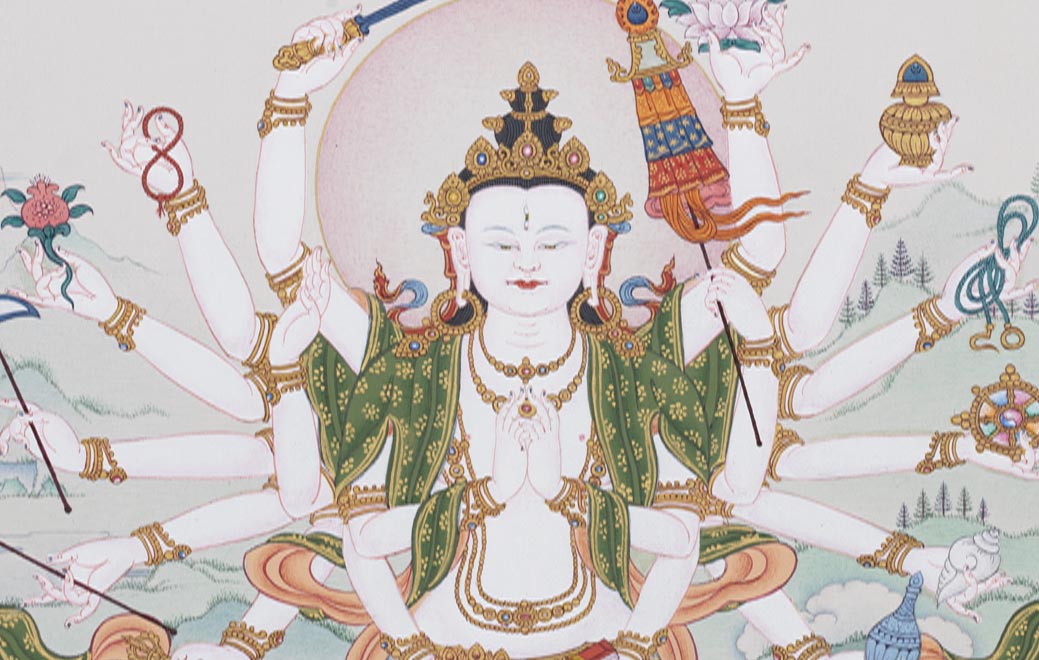Who is Tsundri or Cundi?
The Bodhisattva Tsundri, also known as Cundi or Zhunti is known to have a great spiritual status. She is the Bodhisattva who is believed to be the true manifestation of the World-Honored One, as she helps us enter into the Samadhi of Spiritual Power of Transformation of Ocean and Space. The Bodhisattva Tsundri is also known as the Cundi Guan Yin. She usually appears with eighteen arms on a lotus flower.
She is also sometimes referred to as the "Goddess of the Seventy Million Buddhas."
Meaning of the Word Cundi
The word Tsundri, or more commonly known as Cundi, can literally be translated from Sanskrit as “Supreme Purity.” She is the almighty whose Tantric epithet is the most victorious Vajra. It is also called the Subjugation Vajra. She is the mother of all the deities of the Lotus class. Therefore, she is known as the Buddha Mother - the Mother of Seven Kotis of Bodhisattvas and Buddhas.
The Bodhisattva is revered in the esoteric East Asian Buddhism, or Tangmi. However, she is less known in the Tibetan Buddhism tradition or among the Western Buddhism enthusiasts. These sacred, esoteric Buddhist teachings can usually be dated back to the later period of Indian Buddhism, from the seventh century onwards.
The Unique Iconography of Cundi
Cundi usually appears with eighteen arms and three eyes. Furthermore, on her head rests a bejeweled crown. It is mounted with a figure of a manifested Buddha. Other various pearl and jade ornaments adorn her physical body which is yellow. Along with the special ornaments, she also wears a white celestial garment.
As for her other iconographical features, she holds different ritual paraphernalia along with having a couple of her hands together in mudra. These are the features that come with having eighteen different arms. She is generally depicted as being seated on a lotus throne and her two original hands form the Root Mudra, which is also known as the Mudra of Life.

As for her other sixteen arms, they hold different implements in a clockwise direction. A precious vase, a wish-fulfilling banner, a lasso, a bathing vase, a lotus, an eight-spoked wheel, a conch, a vajra scepter, a wisdom chest, a head-dress, a heavenly fruit, a hook, an ax, a wisdom sword, mala beads (for counting the mantra), and the Fearless Mudra.
Not only do the eighteen arms hold all these implements, but they also hold symbolic meanings.
The Eighteen Characteristics of Bodhisattva
The eighteen characteristics of the Bodhisattva have a specific meaning. They are said to express the eighteen merits of attaining Buddhahood. These eighteen qualities are considered to be uncommon too.
But more importantly, these Bodhisattva arms are the symbolic representation of some esoteric secrets of the Bodhisattva teachings. They are endowed with the significance of deep and profound principles. These eighteen characteristics helps to distinguish a Buddha from a Bodhisattva in the Mahaprajnaparamita. The eighteen characteristics are:
- His perfection of speech.
- His perfection of the body.
- His perfection of memory.
- His serenity.
- His perfection of impartiality to all.
- His self-sacrifice.
- His unfailing thought to salvage sentient beings.
- His unflagging zeal to salvage sentient beings.
- His unceasing desire to salvage sentient beings.
- The unceasing wisdom to salvage sentient beings.
- Revealing perfect wisdom in the deed.
- The principle of the powers of deliverance.
- The powers of deliverance.
- Perfect knowledge of the future.
- Revealing perfect wisdom in thought.
- Perfect knowledge of the past.
- Revealing perfect wisdom in word.
- Perfect knowledge of the present.
The Mantra from the Cundi Dharani Sutra
“Namaḥ Saptanam Samyaksam Buddha Kotinam
Tadyatha Om Cale Cule Cundi Svaha.”
The Buddha speaks extensively about the various effects and benefits of reciting the Cundi dharaṇi in the sutra.
Many of these effects are supposedly purifying and uplifting in nature. For example, after having pronounced the dharaṇi, the Buddha then says the following:
“If there are bhikshus, bhikshunis, upāsakas or upasikas who memorize and recite this dharaṇi 800,000 times, their deadly karma in every place, created over innumerable eons, will be completely annihilated. In every place where they are born or reside, they will always meet Buddhas and bodhisattvas. They will always have adequate resources and abilities to do as they wish. At any birth, they will always be able to leave the home life and will have the ability to maintain the pure precepts of a bodhisattva. They will be born in human or heavenly realms, they will not fall into evil destinies, and they will always be protected by all the heavenly guardians.”


1 comment
Craig
I am saying the mantra often! Namaḥ Saptanam Samyaksam Buddha Kotinam
Tadyatha Om Cale Cule Cundi Svaha! Ha I cheated! Om HaHaHa Vismaye Svaha, om ah Ksitigarbha thaleng hum! May my efforts and interactions help to liberate all sentient beings in all six realm types in Samsara!